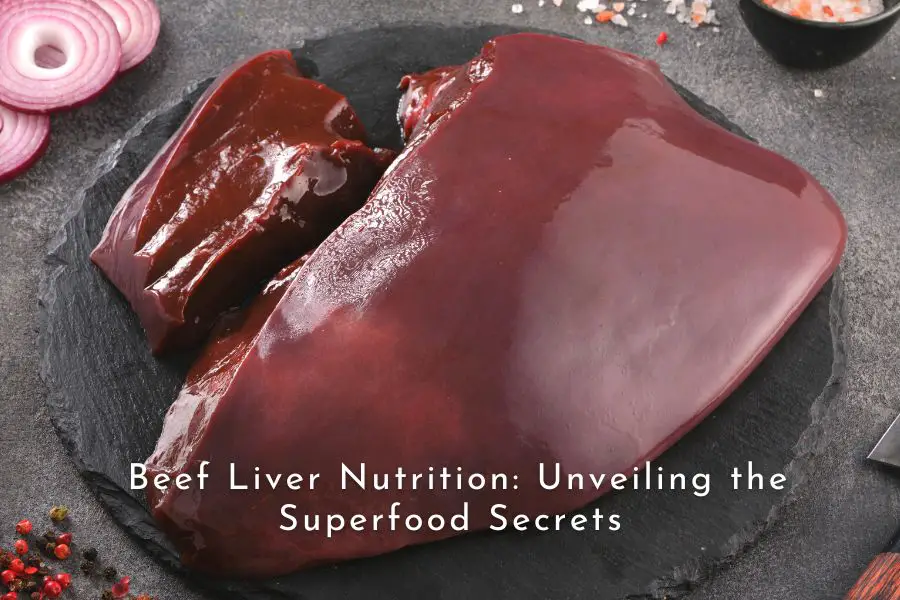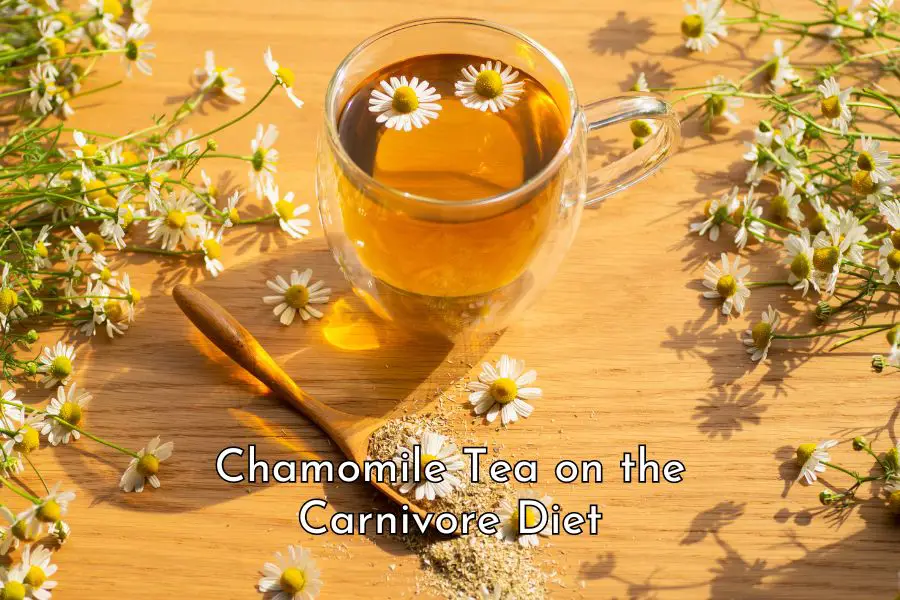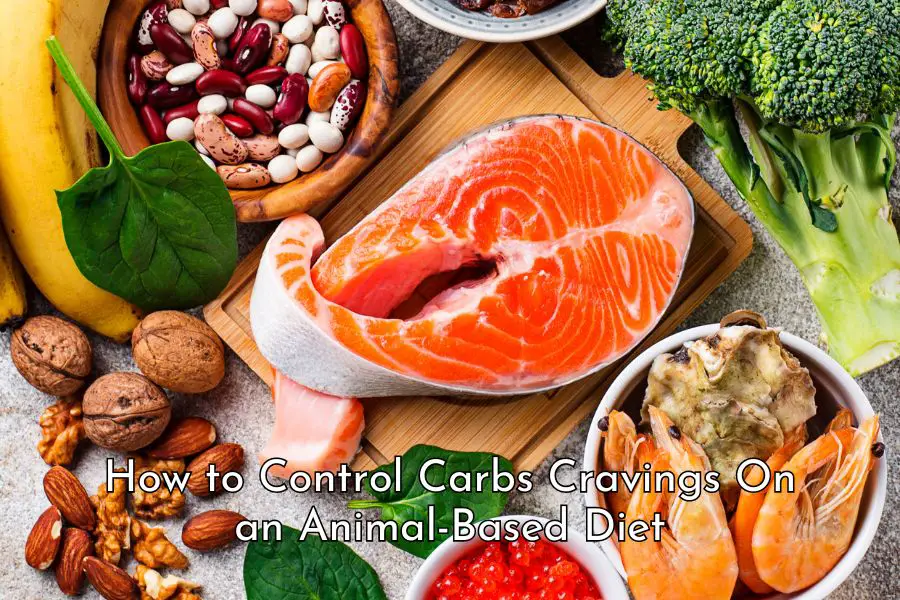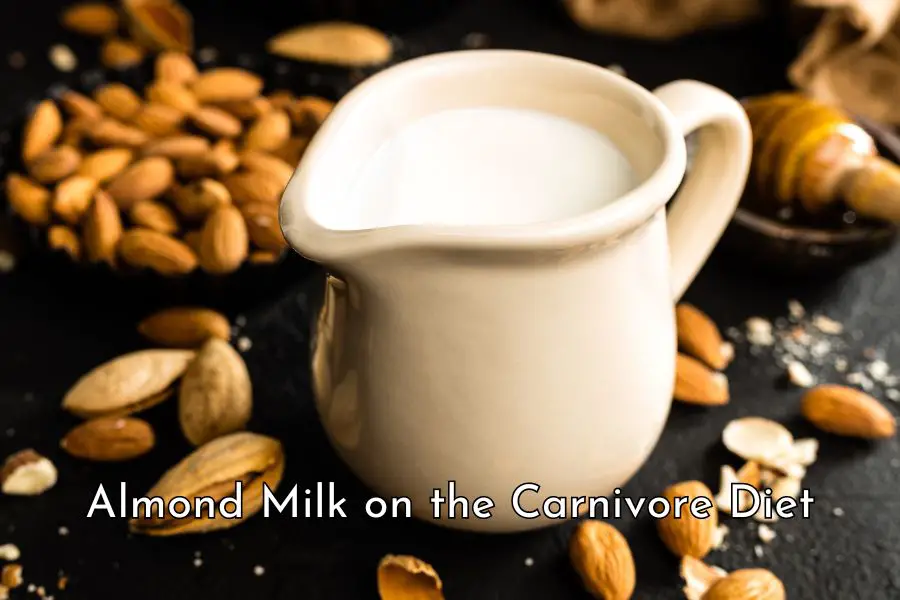Beef liver is unequivocally the most nutrient-dense food from either the animal or plant kingdom that you can ever eat. This cheap organ meat is nutritionally superior to the most expensive supplement on the market that you can buy. If you want to boost your nutrient intake and improve your health, this is the one food that you should definitely eat.
In this article, we will cover the impressive nutritional profile of beef liver, discuss why it is considered the best organ meat to eat, recommend how much beef liver you should eat, and provide practical tips on incorporating beef liver into your diet.
Table of Contents
- Beef Liver Basics
- Beef Liver Nutrition
- Health Benefits of Eating Beef Liver
- Why Beef Liver Is the Best Organ Meat to Eat
- Do You Need to Eat Liver for Optimal Health?
- How Much Beef Liver Should You Eat?
- How to Incorporate Beef Liver in Your Diet?
- Fresh Beef Liver vs Beef Liver Capsules
- Conclusion
Beef Liver Basics
Liver is a vital organ responsible for metabolizing nutrients derived from the food we consume. It processes and transforms the nutrients in our diets into substances that the body can utilize, stores these compounds, and provides cells with them when needed. [1]
Furthermore, the liver is responsible for detoxification, breaking down and removing toxins and harmful substances such as alcohol and drugs. It does not store toxins but instead accumulates various vitamins and minerals while being high in proteins with a low fat content. [2]
Beef liver is one of the largest organs, with a weight ranging between 5-20 pounds, depending on the age and size of the cows. Calf liver weighs less, while cow liver tends to be a lot heavier.
Aside from pâté, beef liver and liver, in general, are not commonly consumed in Western diets and are typically utilized in pet food production. Even in certain Asian cultures that once valued animal livers, there has been a shift away from consuming liver and organ meat due to outdated advice from healthcare professionals recommending the avoidance of organ meats.
Nevertheless, the increasing popularity of ancestral and carnivore diets in recent years has led to a renewed demand for liver and organ meats.
Beef Liver Nutrition
Beef liver is truly a superfood due to its exceptional and unmatched nutritional profile. Let’s have a look at its nutrient content below to see why it is considered the most nutrient-dense food on the planet.
Just a 100-gram serving of beef liver provides the following: [3]
| Nutrient | Value | DV (%) |
|---|---|---|
| Calories | 135 calories | |
| Protein | 20.4 g | |
| Fat | 3.6 g | |
| Carbohydrate | 3.9 g | |
| Calcium | 5 mg | 1 |
| Iron | 5 mg | 27 |
| Magnesium | 18 mg | 5 |
| Phosphorus | 387 mg | 31 |
| Potassium | 313 mg | 7 |
| Sodium | 69 mg | 3 |
| Zinc | 4 mg | 36 |
| Copper | 9.76 mg | 1,084 |
| Manganese | 0.31 mg | 13 |
| Selenium | 39.7 mcg | 72 |
| Vitamin C | 1.3 mg | 1 |
| Vitamin B1 (thiamine) | 0.189 mg | 16 |
| Vitamin B2 (riboflavin) | 2.76 mg | 210 |
| Vitamin B3 (niacin) | 13.2 mg | 83 |
| Vitamin B5 (pantothenic acid) | 7.17 mg | 143 |
| Vitamin B6 | 1.08 mg | 64 |
| Vitamin B9 (folate) | 290 mcg | 73 |
| Choline | 333 mg | 61 |
| Betaine | 4.4 mg | |
| Vitamin B12 | 59.3 mcg | 2,471 |
| Vitamin A | 4970 mcg | 552 |
| Vitamin E | 0.38 mg | 3 |
| Vitamin D | 1.2 mcg | 6 |
| Vitamin K | 3.1 mcg | 3 |
As mentioned above, while liver filters out toxins, it is not a toxin storage organ, instead, it is truly a nutritional powerhouse.
As can be seen in the above table, in addition to quality proteins and fats, beef liver provides all essential vitamins and minerals. It is especially rich in vitamin A, B vitamins, copper, zinc, iron, and selenium. A small serving of beef liver can provide many times of the recommended daily intakes of many beneficial nutrients, including vitamin A, vitamin B12, copper, vitamin B2, and vitamin B5.
Health Benefits of Eating Beef Liver
Beef liver offers several health benefits, in particular: [4, 5, 6, 7, 8, 9, 10, 11]
- Rich in Nutrients: Beef liver is a concentrated source of many nutrients, including good quality proteins, good fats and many essential vitamins and minerals. It is particularly high in vitamin A, vitamins B12, B2, B3, B5 and B6, iron, copper, zinc, and folate. These nutrients play crucial roles in maintaining overall health, supporting the immune system, and promoting proper growth and development.
- High in Vitamin A: Beef liver is one of the best food sources of preformed vitamin A, which is essential for vision, immune function, and skin health. Vitamin A is a fat-soluble vitamin that plays a crucial role in maintaining the health of various organs in the body. Moreover, vitamin A in beef liver is preformed vitamin A which can be readily absorbed by the human body whereas plant sources only provide pro-vitamin A that needs to be converted to vitamin A by your body
- Excellent Source of B Vitamins: Beef liver is rich in B vitamins, including B12, B6, riboflavin (B2), niacin (B3), and folate (B9). These vitamins are involved in energy metabolism, DNA synthesis, red blood cell formation, and neurological function.
- Iron Content: Beef liver is a potent source of heme iron, which is more easily absorbed by the body compared to non-heme iron found in plant foods. Iron is essential for the formation of hemoglobin and myoglobin, which are critical for oxygen transport and storage in the body.
- High-Quality Protein: Beef liver provides high-quality protein, containing all essential amino acids. Protein is crucial for building and repairing tissues, supporting immune function, and maintaining muscle mass. Plant proteins, on the other hand, are generally considered incomplete proteins because they typically lack one or more essential amino acids.
- Rich in Copper and Zinc: Copper and zinc are essential trace minerals that play roles in various physiological processes, including immune function, enzyme activity, and antioxidant defense. Beef liver contains significant amounts of both copper and zinc.
- Natural Source of CoQ10: Coenzyme Q10 (CoQ10) is an antioxidant that plays a role in energy production within cells. Beef liver contains CoQ10, which is important for cellular energy metabolism.
- Supports Brain Health: The presence of B vitamins, particularly B12, in beef liver contributes to neurological health and may help prevent conditions related to B12 deficiency, such as cognitive decline and anemia.
We are not aware of any study on the benefits of consuming liver for human health, but in a very old yet interesting study, Ershoff (1951) found that rats whose food was supplemented with 10% whole liver powder swam in 20°C water for a significantly longer period than rats fed a basic diet or a basic diet with supplements. [12]
Rats on a basic diet swam for 13.3 minutes before giving up. Those on a basic diet fortified with 11 vitamins managed 13.4 minutes. Incredibly, 9 out of 12 rats receiving liver powder swam for over 120 minutes, while the other 3 swam for 63 to 87 minutes.
This suggests there is something magical and powerful about liver and natural whole foods that synthetic vitamin supplements cannot emulate.
While foods like kale, green leafy vegetables, berries, avocados, nuts, whole grains, and legumes are frequently included in superfood lists, their nutritional profiles pale in comparison to beef liver. Moreover, the nutrients in these plant foods are often less bioavailable than those in beef liver, due to the presence of plant anti-nutrients. [13, 14, 15, 16, 17, 18, 19]
Why Beef Liver Is the Best Organ Meat to Eat
While organ meats are generally nutrient-dense, liver is the most nutrient rich food of all and amongst animal livers and beef liver is also the best liver to eat.
As can be seen in the table below, overall, liver is the most nutrient rich amongst common organ meats. Liver is a rich source of many essential nutrients and is especially high in vitamin A, B12, iron, zinc, riboflavin, niacin, folate, and other B vitamins.
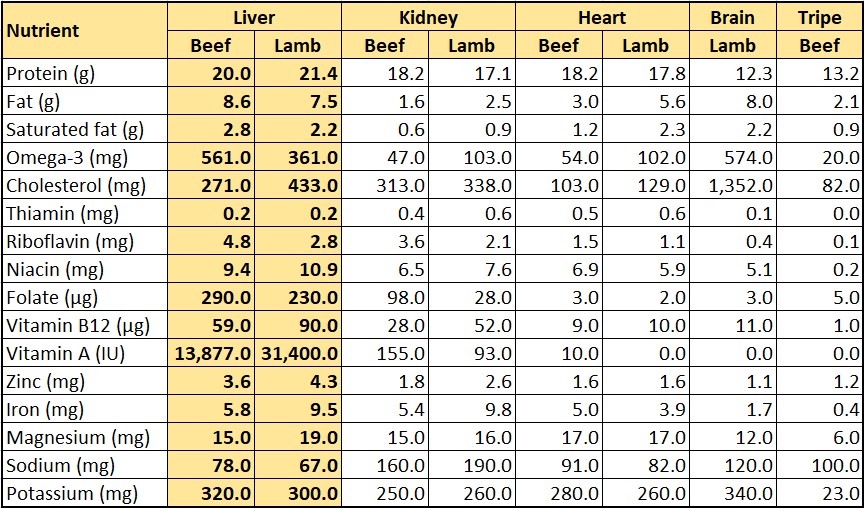
Kidney, heart, brain and tripe are nutrient-dense too but their overall nutritional profiles are not as good as liver. For example, beef and tripe are not as rich in vitamins and minerals as beef liver. Kidney is not as rich as liver in terms of folate, vitamin A, B12, niacin, and zinc. Heart is a good source of the powerful antioxidant CoQ10, some B vitamins, copper, selenium, iron, and zinc but not as good as liver in terms of overall nutritional content. [20, 21]
In addition to being super nutrient-dense, we believe that beef liver has superior quality compared to the livers of other animals, such as commercial pigs, poultry, and fish. This is largely due to the better raising conditions for cows in comparison.
Beef cattle, including grain-fed ones, spend a considerable amount of time grazing on open fields before transitioning to feedlots and being fed grains to reach their slaughter weight. In contrast, commercial pigs, poultry, and farmed fish spend their entire lives in small enclosures and are fed species-inappropriate diets
Do You Need to Eat Liver for Optimal Health?
Currently, there are different views on whether one should include beef liver and other organ meats in their diet for optimal health. One perspective suggests adopting a nose-to-tail approach to obtain all essential nutrients that the body needs. This view is supported by evidence from many cultures that continue to value organ meats today. On the other hand, an opposing viewpoint argues that muscle meat alone can provide all the necessary nutrients, citing examples of tribes that don’t eat organ meats and feed them to their dogs instead.
In our view, both camps can be right. If you are in good health, you can probably get away with eating just muscle meat. But if you are trying to heal from a health condition, incorporating a small amount of organ meat into your diet regularly can help boost your nutrient intake substantially and support the healing process.
Even if our ancestors didn’t eat organ meats, it doesn’t mean we should avoid them too because we do know how nutritious they are and how beneficial they can be to our health.
How Much Beef Liver Should You Eat?
Beef liver is a great source of so many beneficial nutrients but consuming too much nutrients to the levels that exceed your body’s needs is not healthy either.
There is also a particular concern about the high level of vitamin A in liver and that consuming too much beef liver can lead to vitamin A toxicity. [22, 23, 24, 25]
Although some people have reported consuming large amounts of beef liver without ill effects, it is advisable to adhere to the daily recommended vitamin A intake. For men, this translates to a daily consumption range of 18g to 59g of beef liver, and for women, a range of 14g to 59g is recommended to maintain a balanced vitamin A intake.
If you eat beef organs other than liver, please read this article to determine approximately how much you should include them in your diet on a regular basis.
How to Incorporate Beef Liver in Your Diet?
If you follow a strict carnivore diet, in our view, the best way to eat beef liver is to quickly sauté it in a bit of tallow or butter following the steps below:
- Cut the liver into thin slices or bite-sized pieces
- Heat a skillet or pan over medium-high heat and add a small amount of tallow or butter
- Sauté the liver for 2-3 minutes on each side until browned but still slightly pink inside.
Beef liver cooked this way will have a mild sweet and earthy taste and a soft texture. If you overcook beef liver, it will be rubbery and tough and have a strong mineral taste.
However, if you are new to eating organ meat, especially liver, it may be challenging to eat it this way due to liver’s distinctive and unfamiliar flavor and texture. Below are some tips to make it more palatable:
- Soak the Beef Liver: Soaking the liver in milk or a mixture of milk and lemon juice for 1-3 hours before cooking. This can help reduce its strong offal flavor and make it more palatable
- Mix with Other Meats: Blend minced beef liver with other ground meats like beef or pork when making meatballs, burgers, or meatloaf. The strong flavor of the liver becomes less noticeable when combined with other meats. You don’t need to use a lot of beef liver, just a small quantity can already greatly increase the nutritional content of your dish
- Use Bacon to Add Flavor: Fry chopped bacon till crisp before adding beef liver slices and sauteing them till medium. The bacon flavor will help mask the liver’s taste
- Make a Pâté: Pâté is a delicious way to add more beef liver into your diet. Store-bought pâté is commonly made from pork fat and pork liver but you can also make your own pâté at home using beef liver or lamb liver which is likely to be more healthy
- Create Liver Jerky: Make your own liver jerky by thinly slicing beef liver, marinating it in your favorite spices, and dehydrating it. This can be a convenient and nutritious snack
- Incorporate into Other Dishes: Cut beef liver into small pieces and add them to hearty stews, casseroles, or slow cooked dishes. The other ingredients in the dish can help mask the liver’s taste
- Marinate for Flavor: Marinate beef liver in flavorful seasonings before cooking. This can help enhance the taste and make it more enjoyable
- Sauté with Onions and Garlic: Sauté beef liver with onions, garlic, and herbs. The caramelized onions and garlic can add a rich flavor that complements the liver.
Fresh Beef Liver vs Beef Liver Capsules
If you can’t eat freshly cooked beef liver, desiccated beef liver supplements can be a good alternative. While fresh beef liver provides a natural and unprocessed source of nutrients, desiccated beef liver supplements offer convenience and a concentrated form of nutrients in a pill or powder. They have a longer shelf life and are more portable, making them suitable for those who may find it challenging to include fresh liver in their daily diet.
If you’re considering purchasing beef liver and other organ meat supplements, be sure to visit our discount page to take advantage of cost-saving opportunities. We are not a financial affiliate of those organ supplement suppliers and do not receive any commission from your purchases. However, we’ve successfully secured a 15% discount exclusively for our readers, so you can enjoy both the nutritional benefits and savings.
Conclusion
In our view, beef liver is the best way to boost your nutrient intake. The ideal choice is grass-fed beef liver, but if sourcing proves difficult, grain-fed beef liver is also highly nutritious. Being very nutrient-dense, a small serving a few times a week should suffice. Consuming excessive amounts of liver and other organ meats is unnecessary and can be counterproductive.
Other posts you might be interested in:
Is Carnivore the Best Anti-Aging Diet Around?
Debunking Health Risks Associated with Red Meat Consumption
Why Animal-Based Protein Is Superior to Plant-Based Protein
Ground Beef Nutrition: Your Comprehensive Guide
10 Tips to Sneak More Organ Meat into Your Children’s Diet
Disclaimer: The information in this post is for reference purposes only and is not intended to constitute or replace professional medical advice. Please consult a qualified medical professional before making any changes to your diet or lifestyle. Please check out our disclaimer for more detail.

